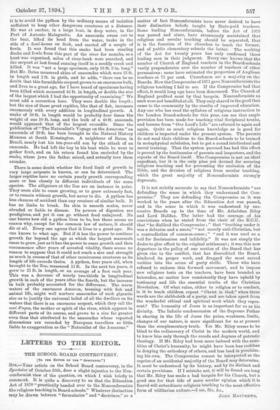LETTERS TO THE EDITOR.
THE SCHOOL BOARD CONTROVERSY.
[To TER EDITOR Or TEE " SPECTATOR:9
Sin,—Your article on the School Board controversy, in the Spectator of October 20th, does a slight injustice to the Non- conformist view of the question, on which I wish briefly to comment. It is quite a discovery to us that the Education Act of 1870 "practically handed over to the Nonconformists the religious teaching in Board-sohools." Whatever distinction may be drawn between "formularies" and "doctrines," as a matter of fact Nonconformists have never desired to have their distinctive beliefs taught by State-paid teachers. Some leading Nonconformists, before the Act of 1870 was passed and since, have strenuously maintained that religious and secular teaching should be separated, that it is the function. of the churches to teach the former, and of public elementary schools the latter. The working of the Act for twenty years has only confirmed these leading men in their judgment. Every one knows that the number of Church of England teachers in the Board-schools vastly preponderates over the number of teachers of other . persuasions: some have estimated the proportion of Anglican teachers at 75 per cent. Churchmen are a majority on the Boards. How the Compromise of 1871 gave Nonconformists the religious teaching I fail to see. If the Compromise had that effect, it would long ago have been denounced. The Church of England profited most by that bargain. Nonconformists as such were not benefited at all. They only shared in the good that came to the community by the results of improved education. Any one who has read the syllabus of religious instruction in the London Board-schools for this year, can see that ample provision has been made for teaching vital Scriptural truths, and lessons from " Our Lord's Life "are referred to again and again. Quite as much religious knowledge as is good for children is imparted under the present system. The parents do not send their children to the Board-schools to be trained in metaphysical subtleties, but to get a sound intellectual and moral training. That the system pursued has had this effect is proved by the testimonies of parents and inspectors, and the reports of the Board itself. The Compromise is not an ideal expedient, but it is the only plan yet devised for securing religious teaching and for preventing the exclusion of the Bible, and the division of religious from secular teaching, which the great majority of Nonconformists strongly deprecate.
It is not strictly accurate to say that Nonconformists "are defending the sense in which they understand the Com- promise." They are defending the Compromise as it was worked in the years after the Education Act was passed, and in the sense in which it was understood by suc- cessive Boards up to the time of Mr. Athelstan Riley and Lord Halifax. The latter had the courage of his convictions when he stated from the chair of the E.C.U. that "he disliked the Compromise ; " that "teaching under it was a delusion and a snare," "not merely anti-Christian, but a contradiction of common-sense ; " "and it was used as a veil for Socinianism and infidelity." It was not simply the desire to give effect to the original settlement ; it was this new departure in the policy of one section of the Board that has given rise to the conflict, that has discredited the Board, hindered its proper work, and dragged the most sacred verities into the arena of party strife. Those who have refused to endorse this forward movement, and to impose new religious tests on the teachers, have been. branded as heterodox, no matter how consistently they have upheld by testimony and life the essential truths of the Christian Revelation. Of what value, either to religion or to conduct, is it to teach children repeat "Christ is God," when these words are the shibboleth of a party, and are taken apart from the wonderful ethical and spiritual work which they repre- sent P The humanity of Jesus is as important for us as his divinity. The Infinite condescension of the Supreme Father in sharing in the life of Jesus the pains, weakness, limits, changes of our nature, is more significant for us at present than the complementary truth. Yet Mr. Riley seems to be blind to the rediscovery of Christ in the modern world, and to know him only through the creeds and dogmas of patristic theology. If Mr. Riley had been more imbued with the sanc- tities of Christ's humanity, he might have been less reckless in denying the orthodoxy of others, and less loud in proclaim- ing his own. The Compromise cannot be interpreted as the caprice of an accidental majority of the Board may determine. It must be understood by its history, and by its distinct and certain provisions. If I mistake not, it will be found ere long that Mr. Riley has made a bad bargain for his Church, but a. good one for that tide of more secular opinion which it is feared will subordinate religious teaching to the most effective form of utilitarian culture.—I am, Sir, &c., JOHN MaYrTnEws.






































 Previous page
Previous page